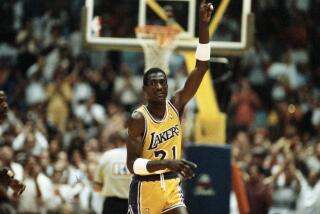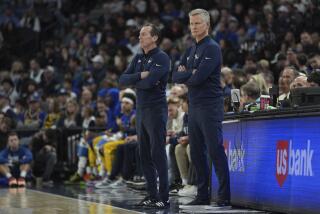Harper’s Vindication Is, Indeed, Timely : Guard Is Making Up for Precious Seconds Lost in ’84 Playoffs
- Share via
Had it not been for a six-second span two years ago on national television, Derek Harper probably would be known as just another National Basketball Assn. point guard trying to keep a starting job.
But notoriety fell upon Harper on the afternoon of May 6, 1984, when he unwittingly committed one of those blunders that will live forever in the lore of sports. Harper was a rookie for the Dallas Mavericks at the time, but his error was far more than just a rookie mistake.
It was Game 4 of the ’84 Western Conference semifinal series, and the Lakers and Mavericks were tied, 108-108, with six seconds left when Dallas Coach Dick Motta brought in Harper to handle the ball before going for a potential game-winning shot.
Harper, apparently believing that the Mavericks had a one-point lead, caught the inbounds pass near half-court and dribbled out the clock. When the buzzer sounded, a satisfied Harper tossed the ball to the referee and started running to the locker room. Moments later, Harper realized that something was wrong, and a look at the scoreboard confirmed it.
Embarrassed and confused, Harper covered his face with his hands. That sickening feeling only got worse during overtime when the Lakers pulled away to a 3-1 lead in the series.
No matter what Harper has done since that fateful day--and he has done a lot lately for the Mavericks--the bizarre incident does not fade from memory. In the two seasons that have followed, Harper has often been asked about it. The play is even featured in Harper’s biography in the Mavericks’ media guide.
Now, however, there are other, considerably more positive, items to add to Harper’s bio. In what might be considered a second chance against the Lakers in the playoffs, Harper has been vindicated for his 1984 blunder and seems determined to make the Lakers pay for it.
In the final seconds of Game 3 last Friday at Dallas, Harper found himself with the ball in three-point range and with the Mavericks trailing, 108-107.
Or was it tied, 108-108?
No, Harper was sure of the score this time, and he proved it by sinking a three-point shot that gave the Mavericks a 110-108 victory.
Throughout the Laker-Mavericks series, which will resume tonight with Game 6 at Reunion Arena in Dallas, Harper has been second to Mark Aguirre as the most consistent Maverick. Clearly, his outstanding play has been the biggest surprise in a series full of surprises.
Harper is averaging 18.2 points and 10 assists in the five games. He has more steals, 13, than turnovers, 10, and is shooting 59.4%. Quite a departure from the regular season, when Harper averaged 12 points and 5 assists a game.
“This is a totally different series than two years ago,” Harper said. “It just so happened that when I was a rookie against the Lakers, I made a big and bizarre mistake. It was a mental error that I’ve had to live with.”
Even after he won Game 3 with the three-point shot and made 7 of 10 shots in Game 4, Harper said it probably won’t make people forget what happened two years ago. But it certainly helps Dallas fans forgive him.
“Outsiders will never let that die,” Motta said. “(Derek) will never live that down. Look at that Wrong Way Roy Riegels guy (the Cal center who in the 1929 Rose Bowl game picked up a fumble and ran the wrong way with it against Georgia Tech).”
Harper would rather not. Even though he has often joked about what happened, he naturally doesn’t like to talk about it. After Game 3, he told writers he hoped that his game-winning three-point basket would purge the demons of 1984, but he later said that he knew it wouldn’t. “The thing that’s so great about Derek is that he’s put it behind him,” Motta said. “He had no problems as a result of it. He was young and inexperienced. If that’s going to ruin a guy’s career, the guy wasn’t good enough to begin with.”
Ever since the Mavericks drafted Harper, who played at Illinois, late in the first round of the 1983 draft, Motta figured that it would be only a matter of time before Harper became a starter, as long as he occasionally remembered to check the scoreboard.
It finally happened last Jan. 22, when the Mavericks returned from a four-game trip on which they had lost three games. Motta put Harper into the lineup, in place of Brad Davis.
The Mavericks, under Harper’s floor leadership, did not change immediately. Even though Harper made 11 of 15 shots in his starting debut against the Clippers, the Mavericks still lost by 13 points at home. The next game, Harper let Detroit’s Isiah Thomas score 17 consecutive fourth-quarter points in another Maverick loss.
After that, though, Dallas won five straight and 10 of its next 12 games, and Harper had cemented his starting spot.
“We weren’t playing well, and I thought it was time,” Motta said. “I would have done it sooner, but I was afraid that Brad would take all the brunt of the blame. So, we came home from a bad road trip and made a couple of changes.
“Brad gives us more stability running the offense, but Derek is a better open-court defensive player, and that’s really important.”
Assistant Coach Bob Weiss said: “I think he’s one of the reasons we’ve been shooting better as a team. He can pick guys up high and play stronger defense than Brad. That tends to spread the other team’s offense, which can give us better opportunities at the other end. It carries over.”
At first, Harper said starting was not a big priority. But later, he admitted that it has been what he’s wanted ever since he turned pro.
“I look at it like this: You start your best people,” Harper said. “I feel like I deserve to start. That’s your goal as a player, to be one of the best people. I don’t feel like it was given to me.
“My confidence is up right now. I just hope it continues. I’ve never had a problem with confidence. If the Lakers keep giving me relaxed shots, I’ll keep taking them. Fortunately, they are going in for me.
“I’ve always dreamed of being in a position like that (the end of Game 3), where I could be the one to take the shot to win the game.”
In Derek Harper’s mind, at least, pleasant dreams of Game 3 in 1986 have forever replaced the nightmares of Game 4 in 1984.
DEREK HARPER’S
1985-86 STATISTICS
REGULAR SEASON
MIN. FG% 3PT% FT% ASST PTS 79 Games 27.2 .534 .235 .747 5.3 12.2
PLAYOFFS
MIN. FG% 3PT% FT% ASST PTS vs. Jazz 33.0 .476 .333 .714 5.0 6.5 vs. Lakers 36.4 .594 .778 .800 10.0 18.2
NOTE: Figures for minutes played, assists and points are per game.
More to Read
All things Lakers, all the time.
Get all the Lakers news you need in Dan Woike's weekly newsletter.
You may occasionally receive promotional content from the Los Angeles Times.






